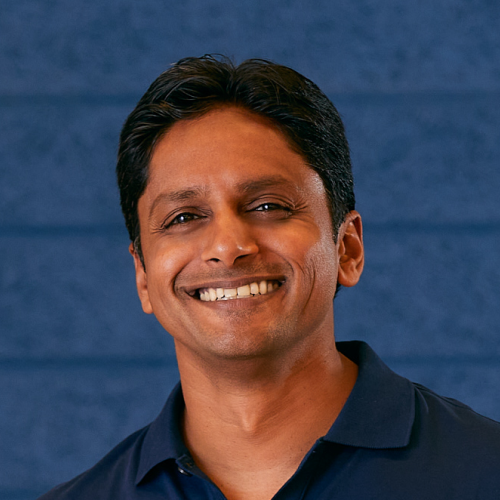Samsara, a developer of the connected operations cloud, raised $805 million in its initial public offering Wednesday after pricing shares at $23 each, the top of the proposed range.
Shares began trading on the New York Stock Exchange under the ticker symbol IOT. The company’s valuation is around $11.5 billion.
Underwriters have the option to buy an additional 5.25 million shares, equaling $120.75 million in gross value.
San Francisco-based Samsara provides a connected cloud to modernize physical operations, such as commercial fleets and industrial activities. The company, founded in 2015, now has more than 20,000 customers in the energy, food and beverage, construction and manufacturing and transportation industries.
Samsara founders Sanjit Biswas and John Bicket, who are now billionaires thanks to the IPO, rang the opening bell along with other company executives Wednesday at the New York Stock Exchange.
Kiren Sekar, Samsara’s chief product officer, spoke with FreightWaves after taking part in the ceremony at the Stock Exchange.

The interview has been edited for clarity and length.
FREIGHTWAVES: You have been Samsara’s chief product officer since the company’s founding. Can you explain your role?
SEKAR: “I look after our product management and development teams, and I’ve been with Samsara since its founding. I worked with our founders at their previous company, Meraki, as well, which was acquired by Cisco for $1.2 billion back in 2012.
“At Samsara, what we’re doing is connecting the world of physical operations to the cloud. So we collect data from our customers’ trucks, of course, but also their heavy equipment, their sites and facilities, their safety data, their mobile apps. We bring it into our cloud and then use our software to help them be safer, more efficient and more sustainable.
“We’re working with customers across a wide variety of industries. These industries actually make up 40% of the global gross domestic product and we’re working with tens of thousands of customers across them.”
FREIGHTWAVES: Can you tell us about the first product Samsara launched back in 2015?
SEKAR: “Our first product was really a prototype that we had built. It was a system that collected different types of data and wirelessly brought it into our cloud, where customers could see where things were on a map, they could see graphs, reports — it was very simple. We actually started by putting it in customers’ commercial refrigerators. We thought, ‘Hey, wireless sensors, we can help understand when the refrigerator’s gonna fail and give them an alert and prevent that spoilage.’
“Fairly early on, the people who are the customers, who are testing the products, would try it out and say, ‘This is amazing. I can see the temperature from my phone, but you know, these refrigerators don’t really fail very often. You know where they fail a lot is in our trucks. If the set point isn’t set correctly, if the doors are left open, you know we can have spoilage and that might be spoiling vaccines, that might be destroying a truck full of frozen lobster. Can you help us with that?’
“That’s an example of that customer feedback loop that then led us to discovering fleets, and as we started working with fleets, we then went from not only tracking refrigeration units but also real-time GPS tracking and our driver app that allowed them to digitize their compliance as well as other people processes.”
FREIGHTWAVES: How does Samsara differentiate itself from some of its competition in the Internet of Things and cloud connection marketplace?
SEKAR: “All of our customers are using legacy technology that really are point solutions. They might have GPS tracking or compliance solutions or a driver safety solution or a different solution to monitor their sites and warehouses.
“A lot of our customers are saying, ‘Hey, we’re trying to digitally transform our operations. It’s not about just one product and just one piece of data. It’s about having data across our operations we didn’t have before. It’s about making that data easy to analyze, easy to act on.’ That’s where our approach of building a platform that spans many products and use cases in a single system is really differentiated.
“The customers want outcomes, they don’t want data. They want it to be simple, they want it to be effective and want to say, ‘Here’s how I’m reducing accidents. Here’s how we are improving efficiency. Here’s how we are increasing sustainability.”
FREIGHTWAVES: What prevailing trends do you see with Internet of Things technology and connected operations clouds in the near future?
SEKAR: “We’re seeing a few key themes. One is more data. Customers are looking at: ‘How do we connect data from more and more of our operations into Samsara?’ and, for example, expanding from their fleets and field assets into their sites, or in the case of their fleets, expanding from GPS tracking to dashcams.
“We recently introduced a camera connector that allows them to take the side and rear cameras that might already be built into a truck and connect them into our platform. So we’ll continue to see more data and new products that allow our customers to bring data from new parts of their operation into our platform.
“Second is AI. We are just scratching the surface of what we can do with AI and machine learning to take all this data and turn it into new insights that customers can act on to be safer, but also to be more efficient and be more sustainable.
“The third is around software workflows. For customers to really digitize their operations, it has to be easy and intuitive. We’re continuing to build new software workflows that take all the data in the platform and make it very simple for customers to adopt that.”
Click for more FreightWaves articles by Noi Mahoney.
More articles by Noi Mahoney
Nuvocargo raises $20.5M to boost US-Mexico trade











